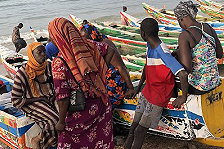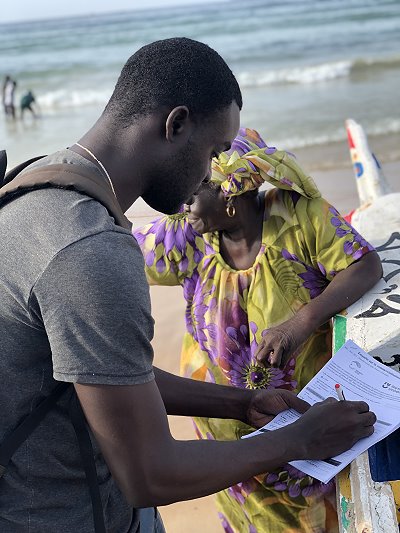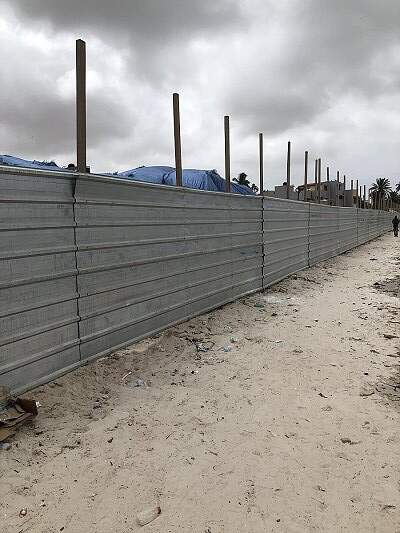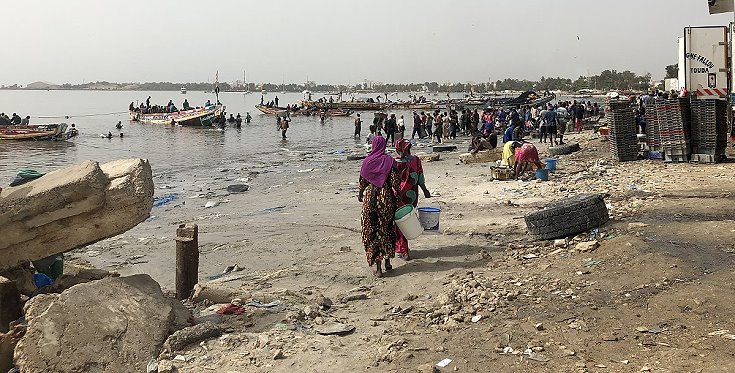Women fish traders have long been central to marketing catches in small scale fisheries and thus not only make their own families thrive, but also contribute considerably to food security to households at national, even regional levels. Though long ignored by officialdom and development projects these women have been coping with remarkable creativity and tenacity the many changes their social and economic context has been undergoing since quite some time. The work of the Small-Scale Fisheries Academy in Senegal has paid special attention to their needs for strengthening their capacities to continue being protagonists rather than becoming victims in the value chains.
The demand to document the conditions of the women fish mongers, particularly the ones with little financial capital, had been voiced for some time in the Academy gatherings, because their problems have increased considerably in recent years. So we happily accepted the request for an internship with Mundus maris in Senegal in connection with the Small-Scale Fisheries Academy. The master student in geography, Mouhamadou Bamba N’diaye of the University of Nantes, had already done some survey work during his studies. He was interested in helping to build up such a documentation. It was a good opportunity to combine the useful for the women with the useful for the student. The agreement was to interview at least 50 women fish traders in Yoff and in Hann. The stage lasted for six months, from March to August 2022.
Following some literature research, preparatory interviews of resource persons on the spot and testing the questionnaires in each place, the actual interaction with the women fish mongers took place mostly in April in Yoff and July in Hann. Resource persons active in the Small-Scale Fisheries Academy in Yoff, notably Abdoulaye Gueye and Marième Soda Seck, and lead women of the Economic Interest Group (GIE by its French acronym) PARASE in Hann, notably Khady Sarr and Maty Ngom, helped to recruit the participants for the enquiries.



Among the major constraints and responses of the micro-fish sellers in the traditional fishing village of Yoff identified through the sample are the following:
- While conditions after the height of the pandemic are slightly improved, lack of access to the fish as raw material of their trade and difficulties to reach clients figured very much at the top of the challenges identified by the women. This is reflected in the extra-ordinary increase of purchasing costs of a crate of sardinella, a small pelagic fish and a mainstay of the human diet in Senegal and the wider region. It is today standing at about 30,000 FCFA (about €45), while the same crate would have cost 1,000 FCFA 20 years ago.
- The lack of even basic infrastructure on the landing beaches and sales places in the vicinity, such as lack of ice and adequate refrigeration containers creates physical and economic post harvest losses. This also provokes health issues for having to set up marketing stalls without proper shelter.
- The irregular landings of the pirogues also create additional constraints as late landings and lack of refrigeration prevent the women from buying greater quantities when they may be available but when it is too late for onward sales. The often long waiting times reduce their productivity and lower their daily incomes.
- Last but not least the lack of adequate access to credit prevents extension of their range of action as most of the time fish has to be paid for in cash.
- The creativity of the women has enabled at least some partial compensatory measures, such as clubbing together in savings groups to support members in their purchasing capabilities and diversifying into other marketing niches when fish is scarce and too expensive.
But it is clear that in the absence of appropriate public social services and infrastructure as well as an effective resource management scheme, the women micro-fish sellers are on the receiving end of the relentless destructive overfishing of industrial fleets, mostly with unclear foreign beneficial ownership.
The situation in Hann is a bit different in that there is a wider spread of women actors on the beach, from relatively large-scale whole sellers, medium-sized whole sellers, micro-fish sellers and fish cleaners servicing end clients buying directly on the beach. While most women participating in the enquiry were handling larger quantities of fish than those in Yoff and thus were considering themselves more as whole salers, their daily earnings were likely higher but not by an order of magnitude. Also during the period of the enquiry landings also showed an appreciable amount of high value bottom fish, not primarily small pelagics.
Many of the challenges and responses identified in Hann had similarities to those in Yoff, though solutions need obviously be site specifically adapted. Among the major ones we mention:
- Lack of hygiene conditions in the different work places of the women were a major concern, especially with middle income clients who may trend in the future to buy more in supermarkets that would rely primarily on factory processed fish rather than that from traditional value chains.
- The construction of a huge refrigeration plant on spaces originally occupied by women fish sellers points in this direction. The women were evicted without compensation and the complex under development is protected by a high fence.
- The women are now relegated to shaky marketing stands with marginal make shift sun protection, if any.
- A major problem is the almost complete absence of sanitation facilities which provoke a heavy burden on the women’s health, particularly the poorer ones without access to a home in the immediate neighbourhood.
- As for access to refrigeration facilities the complaints of the women echo those in Yoff.
- A serious additional issue is the lack of security on the beach. Even though they pay 3,000 FCFA per month for protection of their stores on the beach, theft of merchandise from their make shift containers is a continued problem.
The women group together in Economic Interest Groups and savings groups to face some of these issues head on with their own means and those of their families. They also bring their complaints to the attention of local and national politicians, especially during election campaigns when it is easier to catch their attention. However, without decisive follow-up action by the responsible institutions the women face an uncertain future, especially as industrial overfishing is rife and no visible and effective action by the government and its responsible agencies can be spotted. The largely illegal, unreported and unregulated industrial fishing is a major threat to the entire artisanal value chain actors as the women reported over and over.
A personal account and the final version of the intern’s reports about the enquiries is to follow soon after he has sustained his final exams. The report on the enquiries in Yoff is available here (in French), in Hann here (also in French).
Attempts to feed back the results of the enquiries for validation to the Academy learners and all those participating in the enquiry literally ‘fell into the water’ during the rainy season bringing heavy inundations to homes and meeting rooms in both communities. We will strive to organise these validation meetings in October or November 2022, albeit without the benefit of Bamba N’diaye’s presence.
So far, one can say that the women are certainly under intense pressure and at risk of becoming victims of policies playing out in their disfavour. An earlier interview with Khady Sarr by Aliou Sall, Mundus maris vice president in Senegal, testified already to that in 2018. Aliou found similar patterns of threats in the context of some field work in Guinea during 2017. The women in all those places have managed to find a number of creative answers to keep supporting their families and eeking out a living for themselves. But without more favourable public policies they are likely to continue loosing social, economic and cultural ground. This adds a sense of urgency to the implementation of the Guidelines for Ensuring Sustainable Small-Scale Fisheries (SSF Guidelines) adopted by the FAO Committee of Fisheries in 2014. Our work with the SSF Academy lends operational support. That is more urgent than ever, particularly during the International Year of Artisanal Fisheries and Aquaculture (IYAFA2022), adopted by the UN General Assembly.
Pictures courtesy Mouhamadou Bamba N’diaye, text Cornelia E Nauen
Small-Scale Fisheries Academy
- SSF and Environmentalists rethink fisheries together
- Make Fishing Fair
- Foreign overfishing fuels Senegal’s deadly migration crisis to Europe
- Mundus maris at MARE 2025
- Small-scale fishers at the center of ocean governance and food security
- Make Fishing Fair in the EU, 25 March 2025
- Human – Biodiversity Relationships Across Scales
- World Fisheries Day, 21 November 2024, celebrated in Nigeria
- Mundus maris participated in the 2024 World Fisheries Day organized by Canoe and Fishing Gear Association of Ghana (CaFGOAG).
- Mundus maris contribution to the UNOC3 public consultation
- Small-Scale Fisheries Summit in Rome, 5-7 July 2024
- Regional Symposium on European Small-Scale Fisheries, Larnaca, Cyprus, 1-3 July 2024
- Baltic Fisheries Emergency Meeting, Brussels, 26 June 2024
- Ambivalent role of Market and Technology in the Transitions from Vulnerability to Viability: Nexus in Senegal SSF
- Shell fisheries as stewardship for mangroves
- African edition of 4WSFC in Cape Town, 21 to 23 November 2022
- World Fisheries Day, 21 November 2023
- Webinar: Nigeria’s Fisheries challenges and opportunities
- Presenting the FishBase app at the Symposium in Tervuren
- MARE Conference on Blue Fear – Mundus maris reflects
- The Transition From Vulnerability to Viability Through Illuminating Hidden Harvests, 26 May 2023
- EGU sessions focused on geoethics and joint learning, 23-28 April 2023
- Solidarity with artisanal fishers in Senegal and Mauritania
- The legal instruments for the development of sustainable small-scale fisheries governance in Nigeria, 31 March 2023
- Tools for Gender Analysis: Understanding Vulnerability and Empowerment, 17 February 2023
- Community resilience: A framework for non-traditional field research, 27 January 2023
- Sustainability at scale – V2V November webinar
- European edition of 4WSFC in Malta, 12-14 September 2022
- Mundus maris contributes to SSF Summit in Rome
- Women fish traders in Yoff and Hann, Senegal, victims or shapers of their destiny?
- The Academy continues its work in Yoff
- Illuminating the Hidden Harvest – a snapshot
- Virtual launch event FAO: International Year of Artisanal Fisheries and Aquaculture
- The Small-Scale Fisheries Academy as a source of operational support to PA Guidelines
- World Fisheries Congress, Adelaide, 20-24 September
- Mundus maris supports the fight of Paolo, the fisher, in Tuscany, Italy
- Catching-up – SSF Academy Yoff, 27 Febr. 2021
- Strengthening capacities of the actors for sustainable small-scale fisheries
- Testing training methods during the pilot phase of the SSF Academy in Senegal
- A premiere – launch of a Small-Scale Fisheries Academy in Senegal

